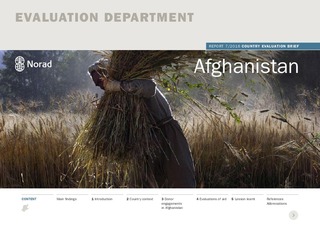Country Evaluation Brief: Afghanistan
Research report
Permanent lenke
http://hdl.handle.net/11250/2475177Utgivelsesdato
2016-11-01Metadata
Vis full innførselSamlinger
- Publications [1488]
Originalversjon
Oslo: Norad (Country Evaluation Briefs no. 7) 38 p.Sammendrag
Since 2001, Western political and military interests have largely defined the nature and magnitude of aid flows. Conventional criteria for development assistance (notably absorptive capacity and credible conditionality) were, as a consequence, ignored or overruled. In some areas, military strategy or tactical concerns dictated aid allocations. Enormous relief and development needs reinforced the rationale for large assistance programmes despite limited absorptive capacity. A major concern is the lack of documented effects on poverty reduction, gender equality and the sustainability of interventions. The Afghan government was by the end of the period unable to generate sufficient revenues to substantially lessen its dependence on foreign funding. Escalating armed conflict underscored the weakness of the state and cast serious doubt on the sustainability of foreign assisted projects and programmes. Despite insecurity and a weak state, there were opportunities for rendering effective assistance through a programme strategy that joined foreign funding with NGOs and a line ministry. The extremely low baseline of development in 2002 made it possible to show early rapid growth in select service sectors in a few years. The greater challenge is to sustain these trends. A health sector reform recorded an impressive immediate output (a fourfold increase in health facilities in the 2002–2011 period) as well as similar results in improved health (under-five mortality was almost halved). The programme for community-based rural development (the National Solidarity Programme) showed that bottom-up development on a local and small scale was possible. While vulnerable to local elite capture, a positive effect is a more positive attitude towards women’s roles and position in society. In the education sector, impressive results were recorded in terms of immediate output (schools built and pupils enrolled). The outcome in terms of quality and attendan
Utgiver
NoradSerie
Country Evaluation Briefs 7Country Evaluation Briefs 7
